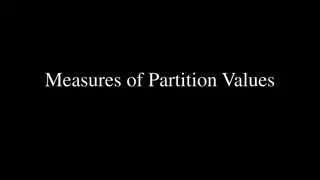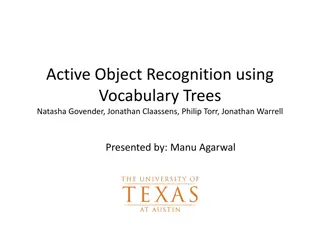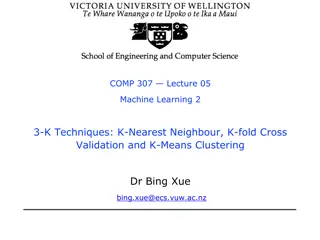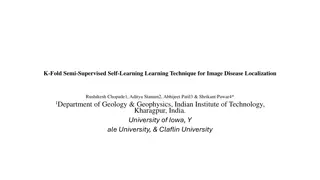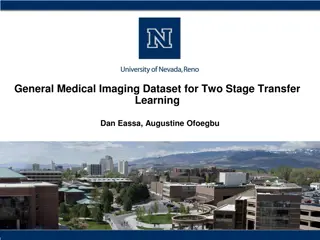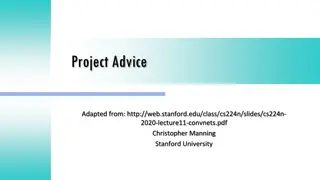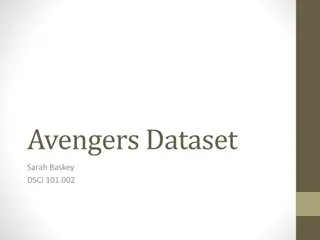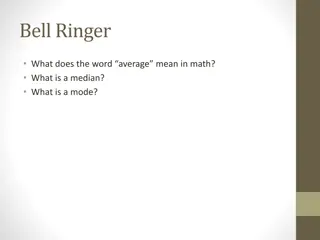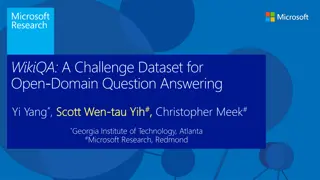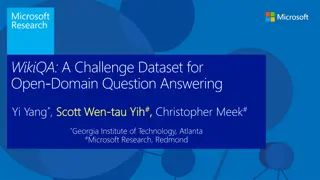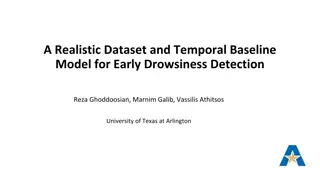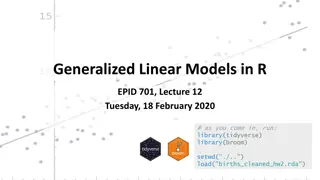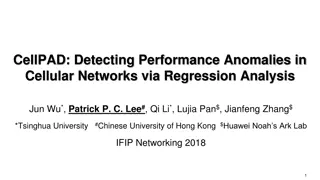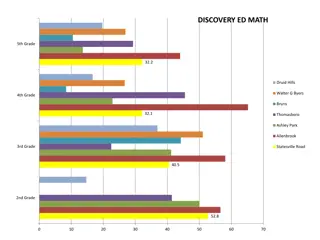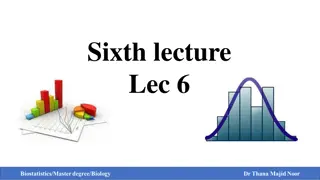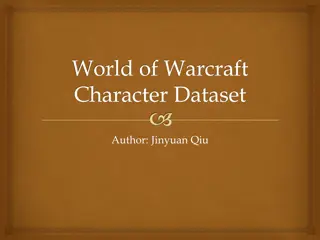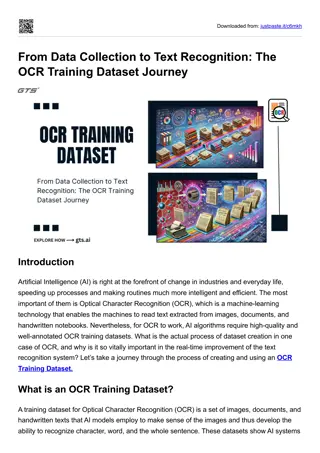Actions Emanating from the Evaluation of the Governance Reform
The evaluation of the governance reform within the WMO aimed to assess its alignment with strategic objectives, effectiveness in responding to societal needs, coordination efficiency, decision-making process, agility, and more. Evaluation criteria included relevance, design validity, effectiveness,
1 views • 13 slides
Understanding UKMOD: UKHLS Input Data Analysis
UKMOD-UKHLS is a versatile dataset derived from the UK Household Longitudinal Study (UKHLS) for policy years 2010-2019. It aims to provide valuable insights for longitudinal analysis in the UK. The dataset undergoes meticulous processing to align with policy years, address data gaps, and deliver acc
0 views • 12 slides
Understanding Supervised Learning Algorithms and Model Evaluation
Multiple suites of supervised learning algorithms are available for modeling prediction systems using labeled training data for regression or classification tasks. Tuning features can significantly impact model results. The training-testing process involves fitting the model on a training dataset an
3 views • 74 slides
Comprehensive School Quality Assurance and Evaluation Process
A detailed insight into the Quality Assurance Department's role in school evaluation and improvement processes, including Whole School Evaluation (WSE), Follow-through initiatives, Teaching and Learning assessments, Resumption and Examination Monitoring. The process involves both internal self-evalu
0 views • 20 slides
Universal Evaluation Framework: Simplifying Evaluation Processes
This session introduces the Universal Evaluation Framework (UEF) developed for evaluating QAA Scotland Enhancement Themes. Participants learn key evaluation questions, evidence capture, and the Theory of Change to enhance evaluation confidence. The QAA Scotland Evaluation Odyssey details historical
2 views • 14 slides
Implementing Blind Evaluation Pilot in HORIZON EUROPE: Key Facts and Process
HORIZON EUROPE is conducting a pilot on Blind Evaluation in the 2023-2024 work program to address biases in the research and innovation evaluation process. The pilot aims to assess the feasibility of blind evaluations in ensuring fairness and mitigating potential biases towards well-known organizati
9 views • 9 slides
Exploring Developmental Evaluation for Better Decision-Making
Delve into the realm of developmental evaluation, focusing on its purpose, principles, and application in practice. Understand how developmental evaluation emphasizes real-time data collection for informed decision-making in complex systems. Learn about key principles such as developmental purpose,
0 views • 25 slides
Enhancing Evaluation Capabilities in Mongolia for Agenda 2030
The Mongolian Evaluation Network in collaboration with UNDP is working to integrate the 2030 Agenda into national strategies and plans, establish institutional coordination mechanisms, align budgets, and enhance data monitoring systems. Key stakeholders including government agencies, NGOs, and inter
0 views • 9 slides
Understanding Evaluation in Education
Evaluation in education is a comprehensive term that encompasses measurement, testing, and qualitative examination of student behavior. It involves both quantitative and qualitative descriptions, along with value judgments. Differentiating from mere measurement, evaluation provides a deeper analysis
0 views • 28 slides
Understanding Partition Values in Statistics
Partition values such as quartiles, deciles, and percentiles play a crucial role in dividing a dataset into various segments for analysis. Quartiles split the data into 4 equal parts, deciles into 10 parts, and percentiles into 100 parts. These values help in understanding the distribution of data a
0 views • 7 slides
Sustainable Evaluation Systems Workshop Summary
Workshop on Sustainable Evaluation Systems by Stephen Porter at the NEC Conference focused on defining evaluation systems, addressing their failures, and emphasizing the importance of quality, use, and networks in achieving sustainability. Participants engaged in activities such as bingo card introd
0 views • 38 slides
Korean Peninsula Issues and US National Security Polling Findings
This polling dataset explores various questions related to the Korean Peninsula issues and US national security. It delves into topics such as the stances of the Biden and Moon administrations towards the Kim regime, potential agreements to address North Korea's nuclear issues, success of the Korea
0 views • 16 slides
Setting up and Running Postal Code Conversion File Plus (PCCF+) - Step-by-Step Guide
In this detailed guide prepared by Statistics Canada, you will learn how to set up and run the Postal Code Conversion File Plus (PCCF+). The process involves creating an input file with unique identifiers and postal codes, producing a new dataset, saving it for import, importing the data to SAS, tra
0 views • 21 slides
Impact and Evaluation Toolkit for Churches and Christian Charities
This toolkit aims to equip churches and Christian charities engaged in small-scale social action projects to think about impact, measure impact, choose data tools, reflect on evaluation data, and use it effectively. It covers principles of evaluation, setting objectives, selecting indicators, storyt
0 views • 34 slides
Overview of Monitoring and Evaluation in the GEF
The Evaluation in the GEF and Training Module focuses on promoting accountability and learning within the Global Environment Facility (GEF) through monitoring and evaluation activities. The GEF Independent Evaluation Office plays a crucial role in assessing results, effectiveness, and performance of
0 views • 25 slides
Developing an Evaluation Work Plan for Effective Program Assessment
This presentation by Amy D. Andrade from San Jose State University focuses on developing an Evaluation Work Plan to identify responsibilities and timelines. It covers topics such as Evaluation Coaching Support, Webinar Outlines, Logic Model, Inputs-Outputs-Outcomes, Two Approaches to Evaluation, Pro
0 views • 29 slides
Active Object Recognition Using Vocabulary Trees: Experiment Details and COIL Dataset Visualizations
This presentation explores active object recognition using vocabulary trees by Natasha Govender, Jonathan Claassens, Philip Torr, Jonathan Warrell, and presented by Manu Agarwal. It delves into various aspects of the experiment, including uniqueness scores, textureness versus uniqueness, and the use
0 views • 49 slides
Machine Learning Techniques: K-Nearest Neighbour, K-fold Cross Validation, and K-Means Clustering
This lecture covers important machine learning techniques such as K-Nearest Neighbour, K-fold Cross Validation, and K-Means Clustering. It delves into the concepts of Nearest Neighbour method, distance measures, similarity measures, dataset classification using the Iris dataset, and practical applic
1 views • 14 slides
Enhancing Image Disease Localization with K-Fold Semi-Supervised Self-Learning Technique
Utilizing a novel self-learning semi-supervised technique with k-fold iterative training for cardiomegaly localization from chest X-ray images showed significant improvement in validation loss and labeled dataset size. The model, based on a VGG-16 backbone, outperformed traditional methods, resultin
0 views • 5 slides
General Medical Imaging Dataset for Two-Stage Transfer Learning
This project aims to provide a comprehensive medical imaging dataset for two-stage transfer learning, facilitating the evaluation of architectures utilizing this approach. Transfer learning in medical imaging involves adapting pre-trained deep learning models for specific diagnostic tasks, enhancing
0 views • 16 slides
Best Practices for Dataset Handling in Machine Learning Projects
Proper dataset handling is crucial in machine learning projects. Use publicly available datasets with train/dev/test splits or create your own. Be cautious of overfitting by utilizing independent validation and test sets. Avoid touching the test set until final evaluation to prevent overfitting. Mai
0 views • 13 slides
Evaluation Synthesis in Changing Contexts: Enhancing Knowledge for Development Effectiveness
Evaluation synthesis is crucial for promoting learning, reflection, and decision-making in development work. This process involves bringing together diverse knowledge sources to generate strategic insights and facilitate wider use of evaluation findings. The Independent Office of Evaluation of IFAD
0 views • 20 slides
Insights from Avengers Dataset
Dataset analysis of Avengers' appearances, gender, status, and years since joining. Obtained from data.world, the dataset consists of 173 records capturing various details about Avengers characters. Methods for examining appearances, gender distribution, status types, and years since joining were ap
0 views • 14 slides
Evaluation of FME Zero Emission Neighbourhoods in Smart Cities
The mid-term evaluation process of FME Zero Emission Neighbourhoods in Smart Cities involves self-evaluation, partner evaluation, and panel evaluation. The procedure includes scientific review, evaluation by scholars, and innovation assessment. Key documents like self-reports, progress reports, and
1 views • 20 slides
Understanding Measures of Central Tendency in Math
In mathematics, the average, median, mode, and range are essential measures of central tendency used to organize and summarize data for better understanding. The mean refers to the middle value of a dataset without outliers, while the median is the middle number when the data is ordered. The mode re
0 views • 14 slides
Overview of Regular Evaluation 2017 Findings in Estonia
In the Regular Evaluation 2017, efforts were made to maximize the benefits of evaluation outcomes for various stakeholders in Estonia such as the state, society, and institutions. The evaluation focused on a range of actions including preparing legislation, finding experts, creating self-report form
0 views • 6 slides
Comprehensive Guide to Training Evaluation Methods
This detailed guide covers the aim of evaluation, evaluation methods, techniques of evaluation, types of evaluation (formative, process, outcome, impact), and the significance of formative and process evaluation in assessing training effectiveness. Learn about the key principles and practices involv
0 views • 45 slides
WikiQA Dataset: Open-Domain Question Answering Challenges
WikiQA Dataset provides a challenge for open-domain question answering, focusing on identifying answers from large-scale knowledge bases such as Freebase and high-quality text sources like Wikipedia. The dataset includes questions sampled from search engine query logs, with candidate sentences sourc
0 views • 24 slides
Open-Domain Question Answering Dataset WikiQA Overview
This content discusses the WikiQA dataset, a challenge dataset for open-domain question answering. It covers topics such as question answering with knowledge base, answer sentence selection, QA sentence dataset, issues with QA sentence dataset, and WikiQA dataset details. Various aspects of open-dom
0 views • 24 slides
Understanding YouTube Video Trends: Dataset Analysis by Grace Dimmer
Explore the factors influencing YouTube video trends through the analysis of the dataset compiled by Grace Dimmer. The project delves into the challenges, insights, and future possibilities associated with deciphering the dynamics of trending videos on YouTube. From data overview to analysis techniq
0 views • 9 slides
Early Drowsiness Detection Dataset and Baseline Model
This study introduces a realistic dataset and temporal baseline model for early drowsiness detection, addressing the critical issue of drowsy driving that leads to numerous accidents and fatalities each year. By analyzing physiological measurements and human behavior, the research aims to improve de
0 views • 21 slides
Association Between Maternal Education and Maternal Age in GLM Analysis
In this lecture on Generalized Linear Models in R, the focus is on examining the association between maternal education and maternal age using a dataset on births. The process involves creating a factor variable for maternal education levels, filtering a smaller dataset, visualizing the univariate r
0 views • 43 slides
Detecting Performance Anomalies in Cellular Networks via Regression Analysis
The study focuses on detecting performance anomalies in cellular networks using regression analysis. It addresses challenges such as labeling, rare anomalies, and correlated factors. The tool CellPAD is introduced for anomaly detection, supporting various prediction algorithms and offering insights
0 views • 19 slides
Research Progress and Results in Image Dataset Analysis
Research progress and results in image dataset analysis including experiment outcomes, discussion on model performance, dataset analysis, and model training. The study covers topics such as analysis of kiwi leaf trips and spots, model ensemble techniques, teacher-student learning, and the effectiven
0 views • 12 slides
Educational Data Analysis in North Carolina Elementary Schools
This dataset provides comprehensive information about math, reading, and science performance in various elementary schools in North Carolina. It includes data on grades, schools, and composite scores for different subjects. The images associated with the data show detailed breakdowns of performance
0 views • 6 slides
Understanding mean, median, and mode in statistics
In statistics, the mean represents the average value, the median is the middle value that divides a dataset into two halves, and the mode is the most frequent value. This guide explains how to calculate these statistical measures and provides examples. Additionally, it demonstrates how to estimate t
0 views • 11 slides
Multi-class Skin Lesion Segmentation for Cutaneous T-cell Lymphomas
This research focuses on developing a multi-class skin lesion segmentation method specifically for Cutaneous T-cell Lymphomas using high-resolution clinical images. The study introduces a new dataset, a novel method called Multi-Knowledge Learning Network (MKLN), and achieves state-of-the-art result
0 views • 15 slides
World of Warcraft Character Analysis Dataset by Jinyuan Qiu
Explore trends in character levels, classes, and races in World of Warcraft using a dataset collected by Jinyuan Qiu in January 2009. The dataset covers character attributes such as level, race, class, and zone, allowing for analysis of gameplay patterns and common traits among characters.
0 views • 5 slides
Human Activity Recognition from Millimeter-Wave Radar Point Clouds
Accurate human activity recognition (HAR) is crucial for context-aware applications. This study presents a framework utilizing mmWave radar-generated point clouds for HAR, addressing challenges related to privacy and sensors. Different machine learning approaches were evaluated, and a new open-sourc
0 views • 11 slides
From Data Collection to Text Recognition: The OCR Training Dataset Journey
The journey of building an OCR training dataset\u2014from data collection to model training\u2014is essential for creating reliable and efficient text recognition systems. With accurate annotations and stringent quality control, businesses can unlock
1 views • 5 slides









